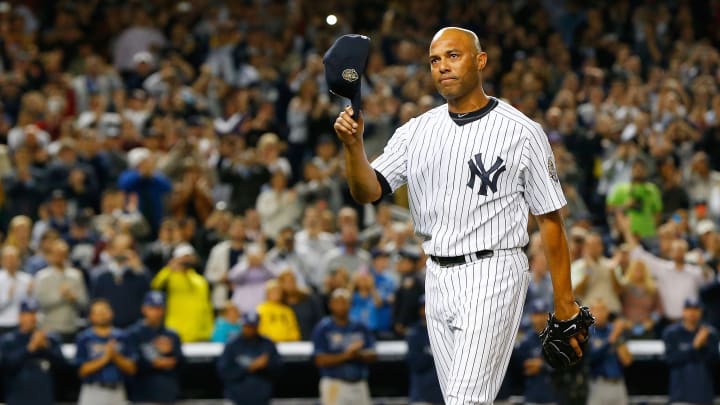Mariano Rivera, Roy Halladay Are Destined for Hall of Fame Enshrinement. Is Anybody Else?

We’re just hours away from learning who will be in the Hall of Fame’s 2019 class, but as ballots arrive, who’s looking good for enshrinement?
Before we get into the votes, a big thank you to Ryan Thibodaux and his Hall of Fame ballot tracker. The tireless work of him and his team provides the backbone of this piece. Special thanks as well to 538’s Nathaniel Rakich, whose election projections are a big help in assembling this as well.
Now for a quick note on the numbers. Per Thibodaux’s tracker, 230 ballots have been counted—225 public, five anonymous. Thibodaux estimates that there will be 412 ballots ultimately cast, which means just over half have been revealed. Candidates need 75% of the vote, or 309 projected tallies, for election.
All percentages and vote totals are current as of the evening of Jan. 22.
Stone-Cold Locks
Mariano Rivera (100.0%) – first year
Roy Halladay (92.6%) – first year
Rivera was a guaranteed Hall of Famer the moment he stepped off the field for the last time. The only question is whether or not he’ll be unanimously elected. He’s perfect so far, but no player has ever pulled off that feat, and it’s unlikely Rivera is the one to end that streak. Someone will deny him a shot at 100%, either because they don’t believe a specialized reliever is Hall-worthy (as was the case with Worcester Telegram & Gazette writer Bill Ballou, who didn’t want to vote for Rivera but chose instead not to submit a ballot—and then sent one with Rivera on it) or as strategy to give a vote to someone who needs it more (as was almost the case with The Athletic’s Dan Hayes, who ended up voting for Rivera). The real chase for Rivera will be to see if he can break the all-time record for highest percentage of the vote, set by Ken Griffey Jr. (who finished at 100% on the public ballots) in 2016 with 99.3.
As for Halladay, of the roughly 200 ballots still unrevealed, he needs a checked box on about 53% of those to make it into the Hall on his first try, making him a near sure thing for election. His 2017 death in a plane crash was gutting, but at least he’ll get this posthumous honor.
Odds Are Strong
Edgar Martinez (89.6%) – 10th year
Martinez was agonizingly close to a bronze plaque last year, finishing with 70.4% of the vote—just 20 ballots shy of election. In his final year of eligibility, though, he looks good to earn Hall honors, as he’s plus-25 in terms of votes gained and lost from last year’s voters and only needs to show up on a little over half of the ballots left to reach 75%. The one wrinkle is that Martinez will see his support dip among the privately submitted ballots; last year, he appeared on just 56.4% of those after appearing on 77.3% of public ballots. A similar drop this year would make this close, but he should make it in, and deservedly so.
On The Cusp
Mike Mussina (81.7%) – sixth year
We’ll almost certainly see a trio inducted into the Hall this summer; Mussina offers the best chance of making it a quartet. In his sixth year on the ballot, the former Orioles and Yankees ace has climbed past the threshold for election on the revealed ballots, but his final margin will likely be razor-thin. Mussina finished with 63.5% of the vote last year, or 49 votes shy, and despite picking up 19 votes so far this year, he still needs to show up on 67% of the remaining ballots to crack 75%. What’s more, like Martinez, Mussina got fewer votes from the private crowd than the public last year, ending up on just 46.7% of those ballots. There’s a chance Moose makes it in, but more likely than not is a Martinez-like narrow miss—and we're talking maybe a dozen votes or so—followed by entrance in 2020. Speaking of next year…
Better Luck In 2020?
Curt Schilling (70.0%) – seventh year
Roger Clemens (71.3%) – seventh year
Barry Bonds (70.9%) – seventh year
The three most controversial names on this ballot are all close to 75%, though none is going to make it in this year. Schilling has regained much of his momentum after getting dinged for his reprehensible comments about journalists, Muslims, transgender people, and pretty much everyone else, adding 17 votes from returning voters (as well as an endorsement from President Donald Trump in the bonkers simulation of reality in which we live). He’ll lose votes on the private ballots, but he’s a good bet to finish in the low 60s—which would be a gain of 10 points from last year—and is well set up for election in 2020 or '21 if he can keep that up.
STAFF: Guessing the #MysteryTeam for Harper, Machado
The same can’t be said of Clemens and Bonds. Neither is garnering much extra support, each having picked up just three extra votes apiece from last year. The problem for both is that those not voting for them because of their steroid ties are unlikely to change their stance going forward; their opposition is set. Both need new voters to be added to the rolls quickly, or older ones to fall off of them, to boost their hopes. As it stands, Clemens and Bonds are likely to finish in the low 60s—a step forward from 2018’s 57.3 and 56.4, respectively, but a small one at that, and time is running out.
Trending Upward
Larry Walker (66.1%) – ninth year
Omar Vizquel (37.8%) – second year
Scott Rolen (20.9%) – second year
For his first eight years on the ballot, Walker looked like a non-starter. The longtime Expos and Rockies star debuted with only 20.3% of the vote in 2011, remained stuck there for two years, and fell all the way to 10.2% in ’14. It took him another three cycles simply to get back to the 20s, leaving him only three years of eligibility to get to 75.
But over the last two winters, Walker has seen his support explode, picking up 40 votes from ’17 to ’18 to get to 37.5%, then adding another 48—the most of anyone on the ballot—this winter to get all the way to the mid-60s. With a finish somewhere in the high 50s or even low 60s probable, Walker can envision a Tim Raines-like push in his final year, especially with voters more likely to throw support toward someone at the end of his eligibility.
Vizquel and Rolen aren’t getting quite that same level of support, but both are looking good for a gradual march to election. The former has added 17 votes, the latter 16, and while their final totals will likely be modest, that’s still positive momentum. Vizquel in particular is in great shape as one of the few players who’s done better on private ballots than public, and he has plenty of time left to win more voters over. A finish in the 40s—which looks likely—would augur well for eventual election. Rolen has a steeper hill to climb, with a path that’ll be closer to those of Martinez and Walker, but he’s made a big stride from last year’s 10.2% finish.
So Long, Farewell
Fred McGriff (39.1%) – 10th year
Despite piling up 45 additional votes this year, McGriff won’t pull off the miracle finish in his last year of eligibility; per Thibodaux's calculations, it’s mathematically impossible for him to reach 75%. Don’t feel too bad for the Crime Dog, though. He may not have earned much love from the voters in his decade on the ballot, but he’s the kind of player tailor-made for the era-based Veterans Committees, given his strength in the traditional stats. With those groups having already elected borderline candidates in Lee Smith and Jack Morris (to say nothing of wholly undeserving players like Harold Baines), McGriff’s moment in the sun at Cooperstown is probably coming sooner rather than later.
VERDUCCI: Why Bryce Harper Would Thrive in Philadelphia
Need Some Help
Todd Helton (17.8%) – first year
Jeff Kent (17.0%) – sixth year
Billy Wagner (17.4%) – fourth year
Gary Sheffield (13.9%) – fifth year
Of this quartet, Helton is in the best shape, earning nearly a fifth of the vote in his first year. Like Walker, he’ll have to fight the Coors Field factor, but he’s got a lot of years left to develop a following, even if his debut wasn't the strongest.
The other three are in shakier shape. Kent has picked up a little bit of extra support, gaining nine votes from last year, and he remains a favorite of the old-school crowd as one of the best offensive second basemen ever. But he’ll enter his seventh year on the ballot hovering around 15–20%, where he’s been stuck since his debut; that isn’t a recipe for success. The same is true of Sheffield, whose gains remain modest and who also has to contend with PED accusations. Wagner, meanwhile, has likely suffered from having to share ballot space with Rivera and 2018 inductee Trevor Hoffman. His case has been a tough one for voters to square, though he’s trending slowly upward, having added 12 votes this year, and has more time left than Kent and Sheffield.
Dead In The Water
Manny Ramirez (25.7%) – third year
Sammy Sosa (11.3%) – seventh year
Andruw Jones (8.3%) – second year
Ramirez has barely moved since joining the ballot in 2017, when he earned 23.8% of the vote. With two PED suspensions on his record, it’s unlikely he’ll ever do much better than that, and he’s not gaining any traction, having lost more votes (six) this year than any other player (although he's picked up three). Likewise with the similarly steroid-tainted Sosa, who barely escaped falling off the ballot last year and is sitting at a plus/minus of one. Jones still needs two votes to break the 5% threshold to stay on the ballot after finishing his first year with 7.3%. He should hang on, but current voters seem decided on his Cooperstown case despite his superlative defense. These three would need miracles to make the Hall a reality.
One And Done
Andy Pettitte (6.5%)
Michael Young (1.3%)
Lance Berkman (0.9%)
Roy Oswalt (0.9%)
Miguel Tejada (0.9%)
Rivera and Halladay will both make the Cooperstown cut, and Helton is safe, but the 17 remaining first-year candidates won’t see another ballot. The only real surprise at being a one-and-done is Pettitte, who despite a lengthy career and plenty of postseason success with the Yankees and Astros needs six more votes to stay alive. Even if he does survive, though, it’s pretty clear that he doesn’t have much support on his side as a player with so-so career numbers compared to his Hall peers, as well as PED connections. It also probably doesn’t help that he’s on the same ballot as far better starters in Halladay, Mussina and Schilling. Maybe once that trio is gone, Pettitte’s chances can improve, but he’s a long shot to make it even that far.
The last four on the list are the only other players to receive votes so far. None are Hall-worthy, though Oswalt had a nice peak, and Berkman is one of the best pure hitters on the ballot, though he wasn’t good at anything else (and is basically Schilling Light off the field).
